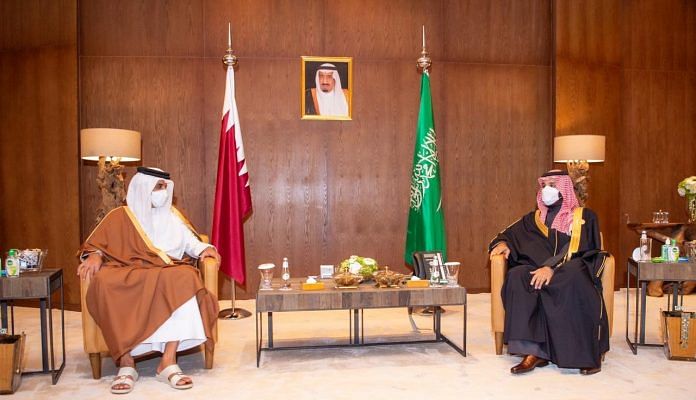New Delhi: Diplomatic relations have been restored between Qatar and four Arab states, including Saudi Arabia, that imposed an embargo against the former in 2017.
In episode 654 of ‘Cut The Clutter’, ThePrint’s Editor-in-Chief Shekhar Gupta looks at Qatar, a tiny Middle Eastern country, which at one point was the richest country in the world and is also very friendly with Iran.
Gupta noted that Qatar houses the biggest US Air Force Base in the region, shares an oil field with Iran and has a per capita income of more than $1,40,000 a year.
Furthermore, the country has a native population of less than 4 lakh and also runs the big media organisation Al Jazeera, even though Qatar itself does not have much freedom of press.
According to Gupta, Qatar was always at odds with the other Gulf countries.
The Gulf Cooperation Council (GCC) included Saudi Arabia, UAE, Bahrain, Oman, Kuwait and Qatar. Five of these turned on Qatar with Saudi Arabia, UAE, Bahrain and Oman, turning on the country aggressively.
However, despite being a small country, Qatar is not a puppet and is a “big powerhouse in its own right,” said Gupta.
Also read: Why Saudi Arabia is in no rush to recognise Israel
Differences between Qatar and Gulf countries
The differences between Qatar and the other Gulf countries began in 2011 after the Arab Spring in Egypt when there was an election and the Muslim Brotherhood — a Sunni Islamist organisation — came to power. Mohammad Morsi was elected as president but Saudi Arabia and other countries were against this government while Qatar supported it.
The current leader of Qatar is a “very wise man”, Sheikh Tamim ibn Hamad Al Thani, said Gupta.
He explained that Thani’s predecessor set up Al Jazeera, which resulted in Qatar being the only Islamic country with a big media empire that is influential across the world, particularly in the Western world.
The rest of the Gulf countries demanded that Qatar curb its ties with Iran and sever ties with Muslim Brotherhood, Islamic State, al Qaeda and Hezbollah, and declare them as terrorist organisations. They also wanted to shut down Al Jazeera and its affiliated stations.
However, Qatar refused to surrender to these demands and in the three years that it was banned by Saudi Arabia and its allies, it emerged more powerful.
Now, Iran was not only a trading partner of Qatar, but also a strategic and tactical partner as well.
Also read: UAE says Qatar media ‘determined to undermine’ efforts to end standoff
What does lifting of blockade mean
There are several implications to the embargo on Qatar being lifted, said Gupta.
He explained that Saudi Arabia knew that a lot of the freedom it enjoyed under the Trump administration would now go away as the new Biden administration comes to power. Biden was also committed to bringing back the Joint Comprehensive Plan of Action (JCPOA). The JCPOA is the Iranian nuclear deal that Trump backed out of and is supported by Qatar.
“Given how close Qatar is to Iran, a Biden administration would now have stakes or interest in Qatar helping with that process,” said Gupta. This is why Saudi Arabia and the other Gulf countries have reconciled with Qatar.
And Qatar reciprocated as it was important for it to come back to the mainstream and be legitimised after being boycotted and blockaded by its neighbours. “As it was living very dangerously in a very dangerous neighbourhood,” noted Gupta.
Gupta sees this as an overall positive change as chances of a rapprochement between the US and Iran are also brightened with this.
This may also indicate chances of peace in Yemen and the possibility of the wars ending in Syria and Libya.
Watch the latest episode of CTC here:



